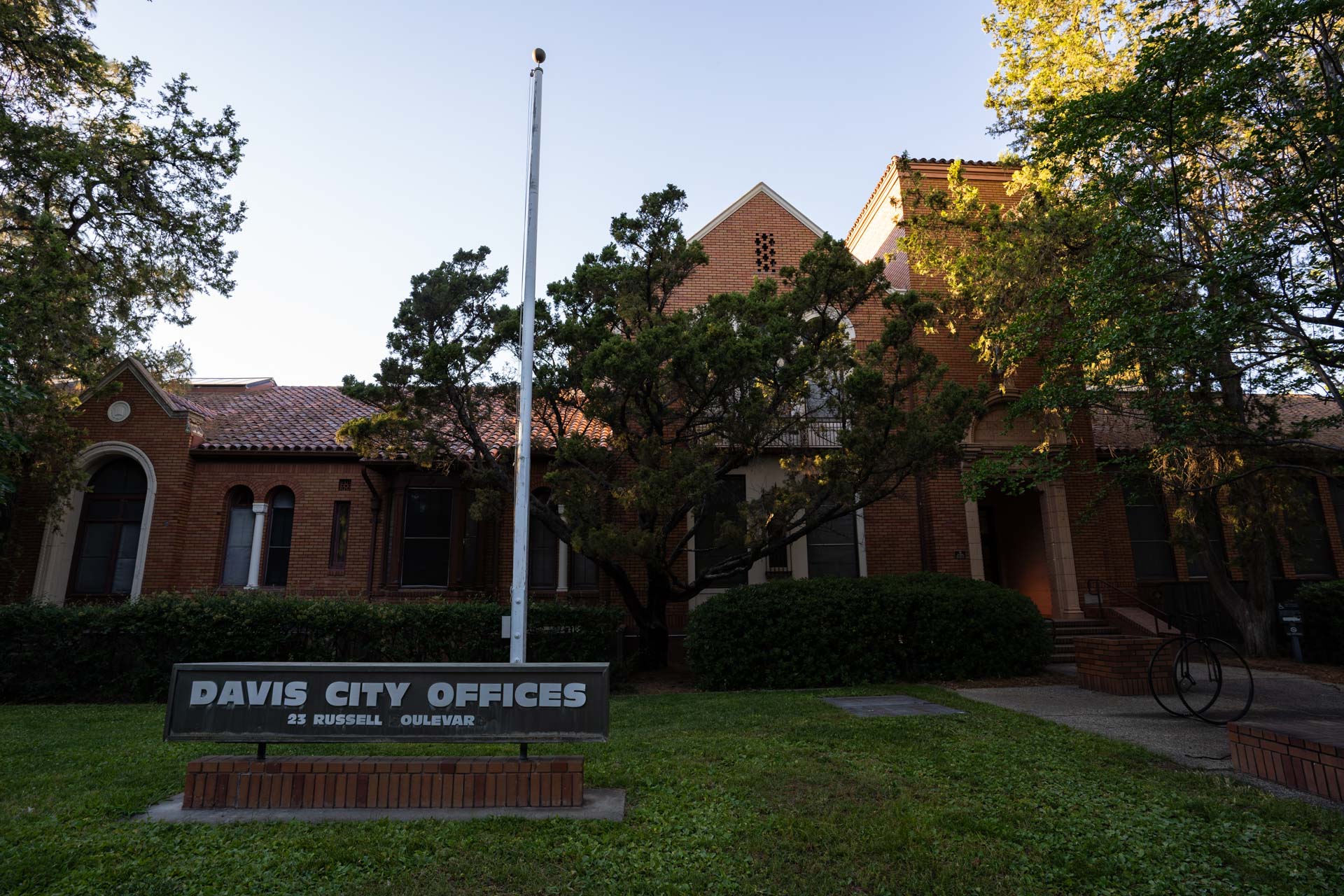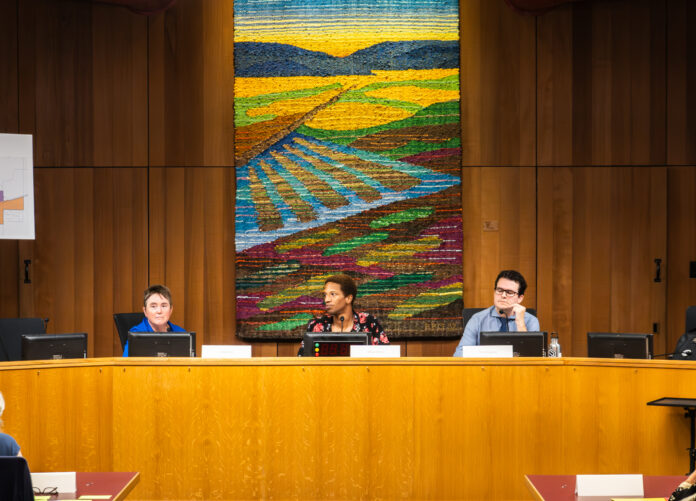The three candidates running for District 2 discussed their positions on hot topics during a forum held by the League of Women Voters
By RORY CONLON — city@theaggie.org
The three Davis City Council candidates running for District 2 discussed plans to make housing more affordable, support business owners and engage with UC Davis students during a candidate forum hosted by the League of Women Voters on Sept. 26 in City Hall. The candidates, Linda Deos, Victor Lagunes and Dillan Horton, answered questions written by the League of Women Voters and the audience.
Sophia Ocampo, a registered nurse and UC Davis alumna, said she was most concerned about how candidates would address rising costs of housing.
“I rent, and I wonder if I will ever be able to afford buying here,” Ocampo said. “I’m 40 years old now. Having been a student here before and rented here 20 years ago, I’m still facing the same issue.”
During the forum, candidates were given 90 seconds each to explain their plans for making housing more affordable to public employees and young adults.
Lagunes, the president of the Davis Teachers Association, said he estimated that 45% of educators cannot afford to live in the area they teach in but offered a possible solution.
“Pushing for designs that are either higher in density or lower in square footage at price points more accessible for individuals […] is one way to move the needle,” Lagunes said. “I also think that investing in our Housing Trust Fund so that we can provide down payment assistance to people starting to build their own equity in those units is another way to move the needle.”
Deos, a member of the city of Davis Planning Commission, said the first step is to recruit public and private partners who manage mutual housing programs. She also pointed to a transportation plan to accommodate the dense housing.
“Get more density going up and around,” Deos said. “Build those duplexes, build those triplexes, build all of those, but we have to link transportation with density.”
Horton, a chair on the Davis Police Accountability Commission, is a renter in the Davis community. He proposed building more diverse types of housing and strengthening a program that supports renters in becoming home buyers.
“It’s important we prioritize building more workforce, market-rate and mixed-use housing, so that families, seniors and working folks can afford to live in town,” Horton said. “We also need to make sure that the First-Time Home Buyer Program has money in the piggy bank. Folks like myself who want to be able to utilize the program to transition out of rental housing aren’t able to utilize that today to move through the housing continuum.”

Candidates then discussed the financial health of the city of Davis. Lagunes said the key to improving the financial health of Davis was through passing Measure Q and supporting small businesses.
“When we talk about our economic development, we talk about our businesses and the need for a greater tax base,” Lagunes said. “I think it’s important that our city has hired an economic development director to conduct outreach and find more incubators to start businesses. I also think it’s important that our partnerships with our local non-profits continue to thrive so they can continue to provide their services.”
Horton said that when he was talking to voters about Measure Q, he encountered resistance from people who thought the city was not doing a good enough job of managing money.
“We need better outreach to affected residents before we formulate new projects or policies, so that we don’t do one project one, two, three times over,” Horton said. “We need to better utilize local expertise instead of paying several thousand dollars to an out-of-town consultant for almost everything we do as a city. If we do these things, we’ll rebuild broken trust with Davis voters and, at the same time, be better stewards of our city finances.”
Deos said that passing Measure Q, which would increase the sales tax by one cent and provide $11 million a year toward essential city services, would improve the city’s financial health and cited her experience as a bankruptcy attorney.
“How do you build trust?” Deos said. “You put people there that you trust, and who’s somebody who can do that? How about a bankruptcy attorney who’s been looking at financial documents for 25 years and saying, ‘Here’s what you need to do.’ That’s what I’m going to bring to the city.”
Candidates also responded to how they would make local government work for students who were unable to vote in the election, either because they were too young or because they didn’t live in the district.
Lagunes said that to increase engagement from college students, the city needs to address their needs.
“The level of housing insecurity and the level of students on social supports like CalFresh are a lot higher now,” Lagunes said. “You can imagine that if your basic needs are not being met then that’s going to limit your ability to engage and access what local government is about. I think voicing that is why I was able to get the endorsement of the Davis College Democrats.”
Horton said millennials and zoomers are issue-based voters who are looking for change on issues that matter in their lives.
“I think it’s critically important that if we want more young people to be willing to vote in any election, not just a Davis City Council election, we need to, as government leaders, make progress on the issues that working-class Davis [residents] are facing in their lives every day,” Horton said. “We need to make progress on expanding access to quality, affordable housing and making it easier to start and operate a small business in this community.”
Deos said that the key to engaging students is inviting them to get involved in city council meetings and reach out about issues affecting the community. She also pointed out the historical significance of the race — if elected to the city council seat in November, she would be the first openly gay lesbian to serve on city council, and Horton could be the first openly gay, African-American candidate elected to office.
“Having that presence is huge,” Deos said. “It’s the same thing if Dillan [Horton] were to be elected — I think that is so important. When I was growing up thinking about coming out, it was like, ‘Oh, Harvey Milk got assassinated, I’m going back into that closet.’ It wasn’t safe for me to come out. [It’s about] showing what’s possible.”
Written By: Rory Conlon — city@theaggie.org







